One Soldier's Story
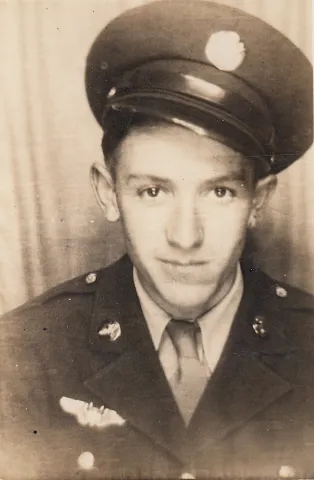
During World War II there were 12,000 heavy bombers shot down. Two-thirds of Allied bomber crews were lost for each plane destroyed. Over 100,000 Allied bomber crewmen were killed over Europe. Six bomber crewmen were killed for each one wounded.
More U.S. servicemen died in the Air Corps than the Marine Corps. While completing the required 30 missions, your chance of being killed was 71 percent. From June 6, 1944 to May 8, 1945 in Europe the Allies had 200,000 dead and 550,000 wounded.
But war is not just about statistics, facts, and dates. It is about real people. Real people whose lives were changed forever. I would like to share one soldier’s story. His name was Joseph Edward Sallings. He was my father.
He was just a senior in high school when he was drafted into military service. He was sent to basic training in Florida, armorer’s school in California and gunnery school in Texas. After that, he was assigned as a waist gunner and was sent overseas in 1944 as a member of the Second Bomb Group, 20th Bomb Squadron, 15th Air Force.
He was stationed near Foggia, Italy. He was probably chosen for a gunner because of his small size. The gunners had a very small space in the plane.
On his first mission, the pilot had to crash land when the engines all went out. There were no injuries. They walked into town where they were met by a group of Tito’s Partisans.
While behind enemy lines he fought with a Czech guerilla band. They were eventually flown back to their outfit where they resumed their bombing missions. The next 11 missions were fairly uneventful.
On their thirteenth mission on August 29, 1944, their target was a synthetic oil factory in Czechoslovakia near the border of Poland and Germany. They were attacked on all sides by German fighter planes.
There were 10 American bombers shot down that day. My father was the only crewman in his unit who was not a prisoner of war or killed. He said he caught a slug in his right shin bone.
When the plane exploded, he was blown out. He pulled his ripcord on his parachute and landed in a tree. He came down into the hands of a German soldier and a Czech policeman. Immediately, there were shots exchanged and the German soldier was killed. The Czech policeman and another man helped him. He was hidden in a barn until they could decide what to do with him. They decided not to turn him over to the Germans but to preserve his life.
The policeman and his family kept him hidden. First in the barn, until a neighbor seemed to be suspicious of the trips to the barn to take food. They later made a hidden room at the back of the pantry in their house to hide him.
They pretended he was a relative who was deaf and dumb if anyone saw him. They knew he could not speak or it would be obvious he was American. The Pesat family risked their lives to save his.
If it had been discovered that they were hiding an American soldier, the whole family would have been executed. He was hidden from August 29, 1944, until May 1, 1945.
Back home in Tennessee, his family only knew that he was missing in action. He was presumed dead. His mother, however, said she knew in her heart that her son was alive.
The war was over for him when in May 1945, Romanian troops marched into the area and helped clean up remaining pockets of Germans. He was sent by train to the American lines and flown to Paris.
He received an honorable discharge on October 17, 1945. His decorations and citations include the Air Medal, the European Theater Ribbon with one Bronze and one Silver Star, the Purple Heart, Bronze Cluster, the Good Conduct Medal and six battle stars.
In 2008, Vlastimil Hela and his son, descendants of the Pesat family, traveled to Tennessee to visit with us. We still maintain contact with him. He was able to share more information about what happened and pictures of the house where my father was hidden. Shortly after his visit, my father’s sister Fern Sallings Wagner and her husband Roy traveled to what is now the Czech Republic to attend an annual ceremony commemorating this historical event.
A plaque for Joseph Edward Sallings can be viewed at the veteran’s memorial wall in Maynardville.
So, you see, each statistic represents a real person just like you and me. Their sacrifices and bravery affect many people. Because of them we can be free. Because of one brave Czechoslovakian family, I am here today.
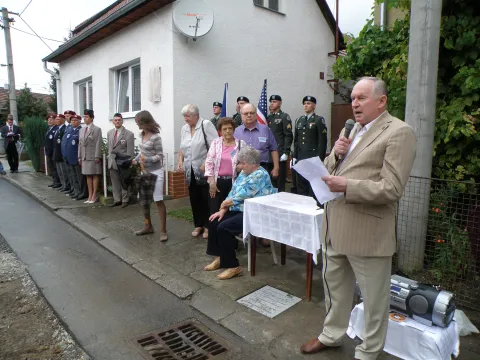
Jiřík Fleischer speaking during the ceremony at which a commemorative plaque was unveiled in August 2009 at the home of the Pešát family in Přečkovice, where they hid Joseph E. Sallings, a side gunner from the Tail End Charlie aircraft, from August 1944 until the end of the war. Photo submitted by Vlastimil Hela
- Log in to post comments
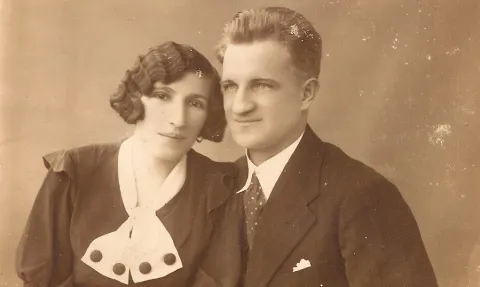
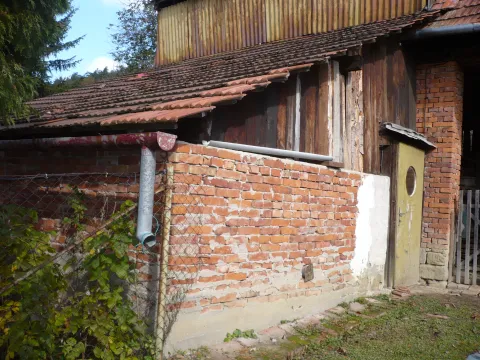
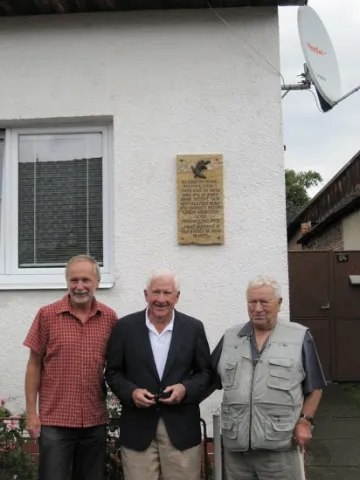
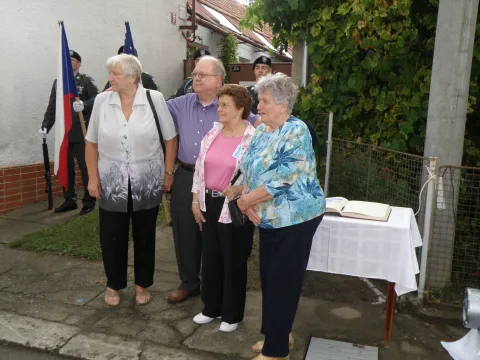
Joseph Sallings
A fascinating story! Thanks for sharing.
Joseph Sallings
Loved reading this! I am sure you are kin to my late husband, Carl Clapp. His great grandfather was Joseph Arley Sallings. My husband would have loved to have read about your father. I know you are proud of him. I know I can speak for my husband in saying, we appreciate everything your father did for us! Thank you for sharing this!